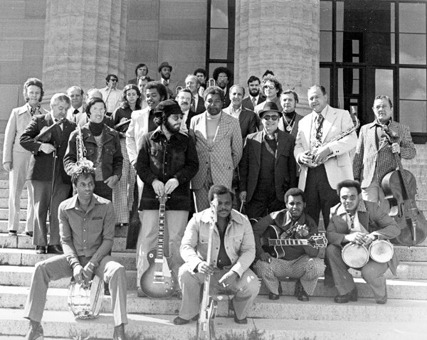Throughout the course of music history, there have been countless artists and bands that have failed to receive the accolades they deserve for their contributions. In an overwhelming majority of cases, such performers were simply "too ahead of their time" or were overshadowed by other artists, leading to their becoming a bit of a footnote in music history. Yet there are a few artists that fall under neither of these categories, and each case is an unjust act onto itself. However, above all other musical miscues and failure to acknowledge influence and efforts, there stands one reality that is a true travesty of music history: The Funk Brothers. Though few are familiar with the name, there is not another band in history that can claim such a string of success, as well as creating the blueprint for almost every style of music that followed. Truth be told, The Funk Brothers were a part of more than two hundred of the most memorable songs of all time, including more than eighty that reached the number one spot on the charts over the years. Many of their melodies and hooks have become parts of international culture, and yet even with the worldwide recognition of their music, few are aware of the artists who created these amazing sounds. The fact remains, if you pick up almost any "classic" song from the "golden age" of Motown Records, you can almost guarantee that the backing band is none other than the legendary Funk Brothers.
Perhaps moreso than any other band in history, the membership of The Funk Brothers was absolutely massive, with more than fifty performers working under that name. However, when one digs deeper into "who played on what," there are thirteen musicians who define the core of the band, and it is they who are the "true" Funk Brothers. From Stevie Wonder to The Supremes to Edwin Starr to Marvin Gaye, these musicians proved time and time again that their ability to create irresistible grooves were far beyond not only their peers, but any band from any other point in history, and it is this reality which enables so many of their songs to remain just as fresh and exciting today as they were more than four decades ago. Whether it was due to the dazzling, deep "walking" basslines of the legendary James Jameson or the groundbreaking drum work from William "Benny" Benjamin and Richard "Pistol" Allen, one would be hard pressed to find a finer and more creative rhythm section from any other point in history. In fact, the way that the rhythm section worked and created together would inspire the style of pop music for more than two decades, and many elements of their form can still be heard to this day. However, it was often the way that the band utilized a wide range of horn players to give their songs such punch as well as diversity, and one can easily understand why it was this combination of sound that completely rewrote "what" was necessary for superior pop and dance music.
Yet there was so much more to the music of The Funk Brothers than just their grooves and horns; and it was these additional elements that led to some of the greatest moments ever captured on tape. Whether it is the iconic guitar lead on The Temptations' "My Girl" or the extraordinary piano refrain on The Isley Brothers' "This Old Heart Of Mine (Is Weak For You)," one can list off countless ways that The Funk Brothers were able to expand their soundscapes with almost any instrument they could find. However, it was when all of these elements came together perfectly, such as on Martha And The Vandellas' classic, "Nowhere To Run," where one can quickly understand just how unique and special a group of musicians existed within The Funk Brothers. Furthermore, up until the point that the group emerged, most musicians of the type were simply "session players" and would be replaced on a whim. But the staff of Motown Records understood that it was this combination of players and personalities that were giving an unmistakable and distinctive sound to their label, and other recording labels would soon follow with their own "regular" configurations. But there is no question that none of these later groups could compare to the influence and outright style one finds in the massive catalog of the "house band" of Motown Records, and it is due to the content of their recordings that one can argue there was never a finer band than The Funk Brothers.
Thursday, January 12, 2012
Subscribe to:
Post Comments (Atom)


No comments:
Post a Comment